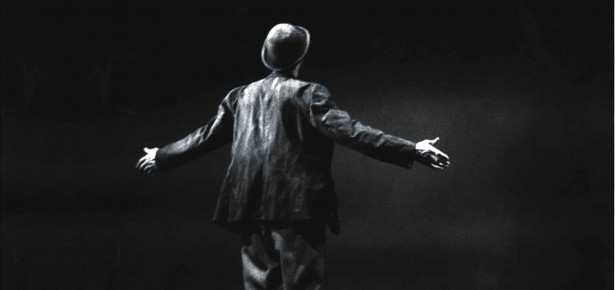
The absurd was not a literary or theatrical “movement,” in any normal sense of the use of the word, but an organic collection of avant-garde writers who were challenging the status quo of modernism and realism in literature and theatre. Their many and varied experiments with language and plot aimed to reveal truths about the human condition (as that is, essentially, what generally all art aims to do) that these writers felt could not be conveyed by modernist literary techniques and/or by fourth-wall realism (in theatre). The oft-thought exemplum of the absurd, for its experimentation with language and plot, is Samuel Beckett’s Waiting for Godot (first published in 1952 and performed in 1953).
I remember the first time I encountered Samuel Beckett’s Waiting for Godot, the play generally considered the quintessential work of the absurd. I did not encounter Godot in the theatre, nor did I encounter Godot from reading the play in paperback, but I first heard about Godot from a four-word response by my 12th grade high school English teacher to some lines of seeming-gibberish uttered by my friend in high school: Mr. Pagani said to Jeff Williams, “Ah, Waiting for Godot!” Nothing more was said of it, and class just continued on as usual. (I think nobody in class wanted to ask what the two of them were referring to, for fear of sounding ignorant.) After school, I raced home and immediately consulted an encyclopedia, finding out about the basic (lack of) plot of Godot and read about the play’s reliance on non sequitors. It all made sense to me, then, what Jeff was doing.
I did not actually get around to reading Waiting for Godot until my freshman or sophomore year at The George Washington University, and I honestly have zero recollection whatsoever of either my first reading of it or my first reaction to it. Somehow, now a couple decades later, having published numerous articles and now my second book on the absurd and writers associated with the absurd, my friend’s fifteen-to-thirty-second homage to the Beckettian non sequitor has stuck with me more than any of my countless interactions with the absurd and those writers associated with the absurd.
Until I heard that validation of that then-seeming-gibberish from Mr. Pagani, whom I adored and looked up to immensely, I had (mis)taken Jeff’s nonsensical phrases purely as an attempt at sounding smart by playing the creative-mad eccentric, and this was, in fact, not so dissimilar to the initial response many theatre critics had to early encounters with absurd theatre. But what has stayed with me all of these years was that Jeff’s creativity and his exaltation and joy of non-linear thinking was appreciated, and that is what greatly appealed (and still appeals) to me.
Life does not come, or play out, in straight lines… and that is what the writers of the absurd were fully cognizant of.
Latest Comments
Have your say!